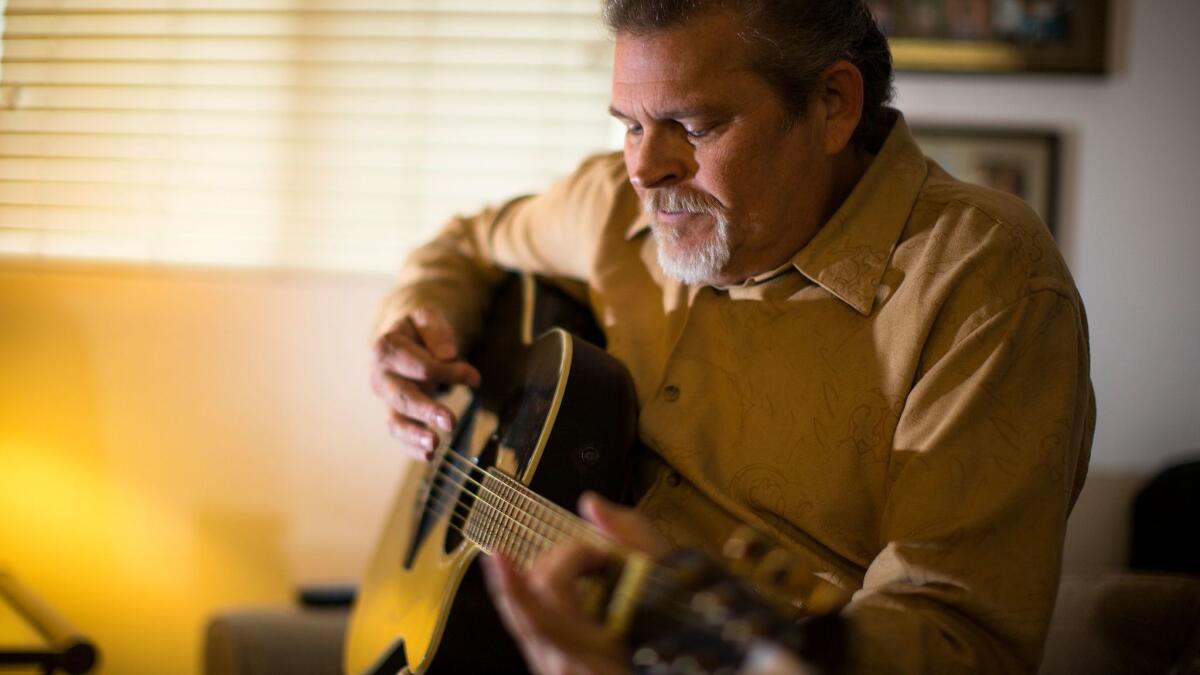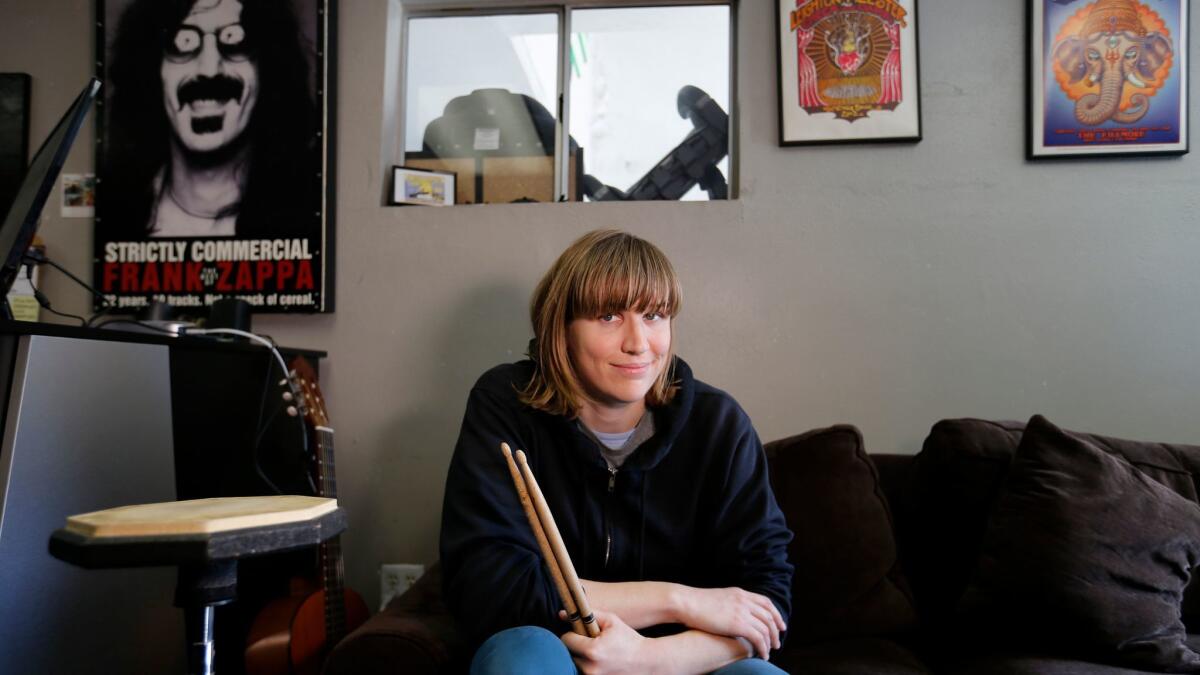For music’s ‘medical refugees,’ Obamacare is a lifeline worth protecting

Last April, doctors told David Ponder, a 57-year-old gospel musician living near San Diego, that his heart was going to fail. He had already had quadruple bypass surgery; without a full transplant he and his music would likely die within months.
Three months later, with the help of the National Academy of Recording Arts and Sciences’ MusiCares charity, he had a new heart. With it came a renewed faith in his music, his beliefs — and the necessity of the Affordable Care Act.
“I’d ask everybody who doesn’t believe in the ACA to put yourself in someone’s shoes who needed it to sustain their life,” said Ponder, who now plans to audition for the new season of “America’s Got Talent.”
Although his procedure was paid for by Medicare and Medi-Cal, Ponder has become one of many musicians lending their voice to MusiCares’ call to protect the ACA.
I’d ask everybody who doesn’t believe in the ACA to put yourself in someone’s shoes who needed it to sustain their life.
— David Ponder, gospel musician
In the last days of the Obama presidency, the Department of Health and Human Services worked with artists including Spoon and the Breeders to highlight how the ACA affected their lives. Veteran artists like Tony Bennett, Bonnie Raitt and Merry Clayton (of the Oscar-winning documentary “20 Feet From Stardom”) entered the national debate by supporting the Affordable Care Act and MusiCares’ efforts to bolster it. (MusiCares and the Jazz Foundation installed a chairlift in Clayton’s home after both her legs were amputated following a car accident.)
“As an industry insider, I know that they really do help thousands of music people each year,” said Neil Diamond, a longtime MusiCares supporter. “I can’t stress enough how important they are and the good work they do.”
In an awards season marked by political activism — at the Golden Globes, Meryl Streep lectured President Trump on civility, SAG award winners denounced Trump’s travel ban — no effort has been as personal as the music community’s efforts to put the pre-Grammys spotlight on healthcare.
According to Neil Portnow, the president of the Recording Academy, the ACA transformed the lives of thousands of music professionals, many of whom may work steadily but without a consistent salary, much less health benefits. ”It’s been liberating and lifesaving,” he said.
“We know firsthand what struggles musicians face,” Portnow said. “It’s important for the public to know that the stars you see at the Grammys are a tiny fraction of our industry.”
As the recording academy’s safety net program, MusiCares provides all manner of financial assistance, addiction counseling and other services to struggling music professionals, including healthcare, which is the focus of Friday night’s annual MusiCares Gala. Last year, the gala raised $7.2 million, and MusiCares worked with more than 6,800 clients. The ACA, Portnow said, allows the group to work with the Department of Health and Human Services to fill gaps in care, rather than just performing triage.
While hardscrabble biographies are a staple of many artists’ stories, few have been upfront about struggles to afford basic things like health insurance, often deep into their careers.
Even “La La Land,” the film many predict to win the Oscar for best picture, glosses over Ryan Gosling’s struggling pianist’s inability to pay his bills. Life as a starving artist may sometimes sound romantic, but for many in the ever-more-precarious music business, calamity can strike at any age or stage of one’s career.
I had eventually just accepted that I would die if I got in a car accident or got sick, but that at least I would die doing what I loved.
— Jesse Nolan, singer of the band Caught a Ghost
In 2011, Robynn James, a veteran country radio host and program director in Virginia, thought she had a bad flu. But when she sought treatment, she learned it was advanced pancreatitis. Doctors asked her to make an end-of-life directive.
She had insurance through her radio station, but James still lost her house in bankruptcy. “I fell into a deep depression. I was fighting for my life, but I didn’t know to what ends,” she said.
Then, after her employer-sponsored insurance ended, MusiCares helped her secure a policy under the Affordable Care Act.
“To have coverage, when I couldn’t have afforded it any other way, was a huge deal,” she said.
As Trump and a Republican-led Congress debate a repeal or major changes to the act, some in the music industry fear the worst.
Activists, inspired by protests like the Women’s March and rallies against Trump’s travel bans, are organizing to preserve the ACA’s benefits.
“People are becoming energized and informed about this issue in ways I haven’t seen since the ACA was passed,” said Rep. Adam Schiff, who represents California’s 28th district, which covers much of Hollywood and the eastern San Fernando Valley, home to many working in the arts. “California has more at stake here than any other state. And especially for folks in the [entertainment] industry who are between jobs or have contracts that fluctuate from year to year, it’s been very beneficial.”

Far from the Grammys’ glitz, many working-class musicians agree. Mindee Jorgensen, the drummer for several touring indie-punk bands such as Peach Kelli Pop, says she had to limit her income to stay on government assistance to afford treatment for bipolar disorder, post-traumatic stress disorder and anxiety.
“The Affordable Care Act allowed me to actually earn more money and start improving my life in other areas, such as saving and recently buying a car,” she said. “The ACA isn’t perfect, but it is way better than it was before.”
Many artists remember the patchwork of strategies they needed to find care before the ACA. “My old band would go on tour in Europe, and as soon as we got off the plane, half the band would go straight to the hospital to get physicals,” said Mason James, co-founder of the L.A. rock band Zipper Club.
“I had eventually just accepted that I would die if I got in a car accident or got sick, but that at least I would die doing what I loved,” said Jesse Nolan, the singer of the L.A. electro-soul band Caught a Ghost. “Now, as a small business owner, my musicians are all more secure in their lives knowing that they have insurance.”
For some touring musicians, who have worked abroad and seen the disparity of care in the U.S., the thought of an ACA repeal is especially galling. Chad Matheny, who records noise-folk and electronic music as Emperor X, moved to Berlin in 2013 after years based in L.A. Soon after, however, he was diagnosed with testicular cancer, and began treatment in Germany. Even as an immigrant cancer survivor, he could still sign up for German public insurance at $80 a month with no co-pays or deductibles.
Without the ACA I am a medical refugee.
— Chad Matheny, musician
“If the protections of the ACA go away, I will be either priced out or completely un-insurable in my home country. Without the ACA I am a medical refugee,” he said.
An estimated 27 million people stand to lose health coverage in the event of a full ACA repeal. For many musicians, the loss of ACA coverage would throw careers into turmoil; for others it could be a matter of life and death.
Since his heart transplant, Ponder sees the fight to keep the ACA’s benefits as a reflection of his lifelong Christian faith. After his surgery, he wrote a song about the transplant experience, “He Was the First Donor.”
James also equates her ACA experience with her faith, and she continues to write and record short, optimistic messages of resilience for local country music listeners and readers on her Facebook page.
“The message of the Bible is that we should take care of each other. If you take nothing else away from it, that’s the point,” James said. “And I believe that kind of care should be available to everybody.”
For breaking music news, follow @augustbrown on Twitter.
ALSO
Musicians rally to defend the Affordable Care Act
Prince, George Michael to be honored at the Grammys
‘No, take me seriously’: Meet the Regrettes and Cherry Glazerr, L.A.’s new faces of rock
Grammys 2017: Complete list of nominees
With ‘Bad and Boujee,’ Migos is finally having its moment
Muna, which doesn’t shy away from big topics, is a local band on a mission
More to Read
The biggest entertainment stories
Get our big stories about Hollywood, film, television, music, arts, culture and more right in your inbox as soon as they publish.
You may occasionally receive promotional content from the Los Angeles Times.











